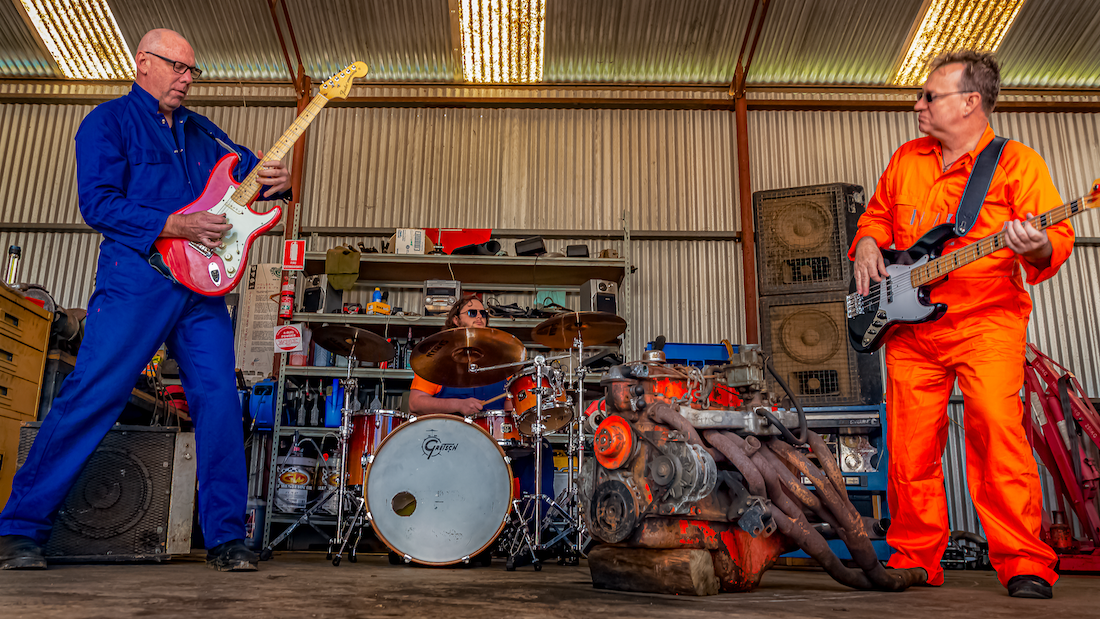
Start your Triple Engines
Perth rock’n’roll power trio Triple Engine will launch their self-titled debut album at the Milk Bar on Saturday, November 2, with support from Interflow and Revive. BOB GORDON chats to vocalist/guitarist Chris Gibbs and bassist/vocalist Craig Skelton about the unusual origins of the band and just what powers them along.
Although you’ve played in many line-ups over the years, you had never co-written songs before. Then COVID-19 happened in early 2020, and Perth went into lockdown. Correct me if I’m wrong, but Triple Engine began as something positive to do in that isolated period?
Craig: Chris and I spent a lot of time communicating with each other as we were adjusting to the lockdown, and a lot of our conversations were about how we were coping with it and the very different life that we were then having to live. Chris and I think we actually played for the better part of a decade leading into lockdown. And prior to just going into lockdown, we were doing a lot of duo gigs. Once the dust had settled with lockdown a little bit, we were really, I think, using each other as a little bit of a sounding board and a bit of therapy. A bit of mental health, checking how we were doing, how we were coping, and using it to really analyse where we were at in our lives as musicians, where we wanted to go.
We talked about developing an original project that we could use to push ourselves forward as musicians—the kind of band that is our absolute preference for playing in. Very much part of that was really trying to, I think, focus on being a guitar-centric power trio. To really recognise where our influences were coming from, really lean into our strengths as players and musicians and the sort of music that we’ve wanted to play and that we enjoyed playing the most.
Chris: I don’t think that we ever would have gotten to a situation without lockdowns where we would have actually, genuinely had time. We would have always just viewed it as something off in the distance, ‘That one day when we have time to discuss this, we’ll discuss it’. Well, it was imposed upon us, and that led to something really good.
It seems that from writing in isolation, the band was very much built upon its first song, Love Thing, which was released in August that year?
Chris: We got ourselves into a situation where we were really going, ‘Well, this really is about the song, because we can’t hide behind fitting in a room where it feels really good to be together. We can’t hide behind volume. We can’t hide behind anything other than the ideas’. And I think that really built Love Thing, because we were first of all trying to write something that reflected the times, and second of all, trying to write something while none of us are going to be in the same room for a long time. That song will always be special to me, because it’s the first song that Craig and I wrote together with Daniel (Skelton, the band’s original drummer), and it was a long time coming. We probably should have been writing together years before, but for various reasons, we weren’t.
Craig: The music is very positive, and it’s very up, and it’s… you know what somebody said? ‘You can’t cry to Van Halen’—you know, it lifts you. And I think we really were feeling the, I guess, the temper of the times and going, ‘Yeah, man, we got to write something happy’. And I think part of the conversation was, ‘I’m just a little bit over listening to all these songs, and all they seem to do is complain, and it’s really dark, and there doesn’t seem to be a lot to hope in the lyrics or the music’.
So I think it was a very conscious thing, and that was that actual line—’And it might comfort you to know there’s a happy ending’, was one of the first lines that really caught me. Chris had written some lines, and that was one of them, and we really hung on to that and made sure that ended up in the final version.
Chris: If I could just mention I was the guy who coined the phrase ‘you can’t cry to Van Halen’, but I disproved my own theory (laughs). There is one song you can cry to called Not Enough (from the band’s 1995 album, Balance). I have cried to that song! So I fully admit that my claim may not be 100%.
Let’s call it 98. So you’re inspired by the guitar/bass/drums attack of bands such as The Police, Rush, Cream, Led Zeppelin and Van Halen. Bands with great engine rooms, hence the band name Triple Engine?
Craig: All three players in the band are engines. No one’s carrying anybody else, and no one’s letting themselves be carried by anyone else. Every member pushes this thing and motivates this thing forward in unison and in equal parts.
As the months rolled on and went into 2021, and some aspects of normality came back, you started playing some gigs, and you could actually get together in person as a band. Was it liberating to finally be in the room, writing songs with each other?
Chris: We were deliberately pushing it ourselves. I think that one thing that was really interesting about it is, to be fair, we didn’t really change the writing style that much. So even though we were able to be together and write in the same room together, we tended towards the way that we started, which was still a lot of demos going back and forth between myself and Craig and sort of getting a framework happening, and then we would get in the room together.
So we actually found a fair bit of comfort in writing in that way, and I think part of it was possibly because we both have very busy lifestyles. And I think it was like, ‘Well, I’m going to send you this thing that I’ve got because I’ve got time to do that’, and then Craig would send something back when he had time to do that. And by the time we got into a rehearsal situation with Daniel, who was our original drummer, it was kind of the situation where we almost treated it like the lockdown writing sessions because we knew that it already worked.
Craig: It gave us space and time to really work on it. We were super conscious about the musicianship and the element of craft we were putting into this. If we’d just been sitting in the same room trying to bang this out, it might have come out faster, but I don’t think it would have been as good.
One of my favourites was the song Western Shore. I deliberately wanted to write something sort of like a 12 bar, and I gave it to Chris, and then a week or so later, I hear back, ‘Yeah, man, it’s good. I’ve done this, and by the way, it’s now 13 bar blues’.
Chris: That was a fun one, because it’s Craig’s experience of moving to Western Australia. So I didn’t have a lot to contribute lyrically because I don’t have that experience. So what I was doing was going, ‘Okay, well, it’s fairly obvious what we have to do here, but how do we turn it into Triple Engine?’ And that was a really good example of it arriving with a basic structure, and then me going, ‘Okay, what could I do with this to turn it into a 3E type of thing?’ And there’s a few great moments in the songwriting on this album.
With the album out now and the launch coming up, what are Triple Engine’s plans looking into next year?
Chris: I think we’re in the situation where there’s a couple of really great ideas from the first batch of ideas that we’d thought, ‘Maybe it’s just too big for us at this point in time’.
I’m really looking forward to tackling some of these more complex concepts that we came up with on those basic demos from the original idea of the band, so we can continue the journey.
